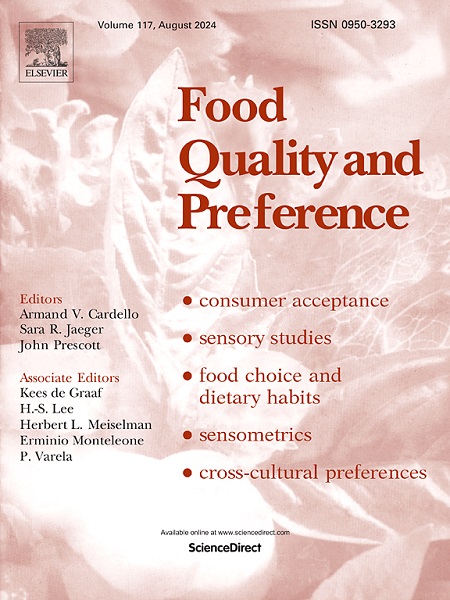Entomophagy in Bangladesh: A cross-sectional survey on the consumer attitudes and readiness to adopt insects as food
IF 4.9
1区 农林科学
Q1 FOOD SCIENCE & TECHNOLOGY
引用次数: 0
Abstract
Edibles insects are considered as one of the promising future foods due to its environmental and nutritional sustainability. As like many western countries edible insects are not part of the traditional diet in Bangladesh. This research was conducted in Bangladesh to assess the knowledge and attitude of the citizens towards entomophagy. The data were obtained by a questionnaire through a pencil-paper and face to face interview method (n = 1014). Results showed that the education level of the respondents was the most predominant factor determining knowledge, disgust sensitivity and willingness to eat insects or insects-based food. Disgust sensitivity is one of the predominant barriers to entomophagy and also halalness was an important factor for the Muslim population. However, respondents having knowledge of entomophagy were open to eat insects or insects-based foods, but from the cluster analysis there was no clustering by social-demographic characteristics observed. Food neophobia of the participants was significantly influenced by all the sociodemographic factors except for gender. Young adults with higher education had lower food neophobia compared to the older adult with lower education level. This survey also confirmed that higher food neophobia was associated with higher disgust sensitivity and lower willingness to eat insects or insects-based food.
孟加拉国的食虫行为:一项关于消费者态度和将昆虫作为食物的准备程度的横断面调查
食用昆虫因其环境可持续性和营养可持续性而被认为是未来有前途的食品之一。和许多西方国家一样,可食用的昆虫并不是孟加拉国传统饮食的一部分。这项研究是在孟加拉国进行的,以评估公民对食虫的知识和态度。采用笔纸问卷和面对面访谈法进行问卷调查(n = 1014)。结果表明,受教育程度是决定昆虫知识、厌恶敏感性和食用昆虫类食物意愿的最主要因素。厌恶敏感性是穆斯林群体食虫行为的主要障碍之一,清真也是穆斯林群体食虫行为的重要因素。然而,具有食虫知识的受访者对食用昆虫或以昆虫为基础的食物持开放态度,但从聚类分析来看,没有观察到社会人口统计学特征的聚类。除性别外,所有社会人口学因素均显著影响参与者的新食物恐惧症。与受教育程度较低的老年人相比,受教育程度较高的年轻人对新食物的恐惧程度较低。这项调查还证实,对新食物的高度恐惧与更高的厌恶敏感性和更低的吃昆虫或昆虫类食物的意愿有关。
本文章由计算机程序翻译,如有差异,请以英文原文为准。
求助全文
约1分钟内获得全文
求助全文
来源期刊

Food Quality and Preference
工程技术-食品科技
CiteScore
10.40
自引率
15.10%
发文量
263
审稿时长
38 days
期刊介绍:
Food Quality and Preference is a journal devoted to sensory, consumer and behavioural research in food and non-food products. It publishes original research, critical reviews, and short communications in sensory and consumer science, and sensometrics. In addition, the journal publishes special invited issues on important timely topics and from relevant conferences. These are aimed at bridging the gap between research and application, bringing together authors and readers in consumer and market research, sensory science, sensometrics and sensory evaluation, nutrition and food choice, as well as food research, product development and sensory quality assurance. Submissions to Food Quality and Preference are limited to papers that include some form of human measurement; papers that are limited to physical/chemical measures or the routine application of sensory, consumer or econometric analysis will not be considered unless they specifically make a novel scientific contribution in line with the journal''s coverage as outlined below.
 求助内容:
求助内容: 应助结果提醒方式:
应助结果提醒方式:


